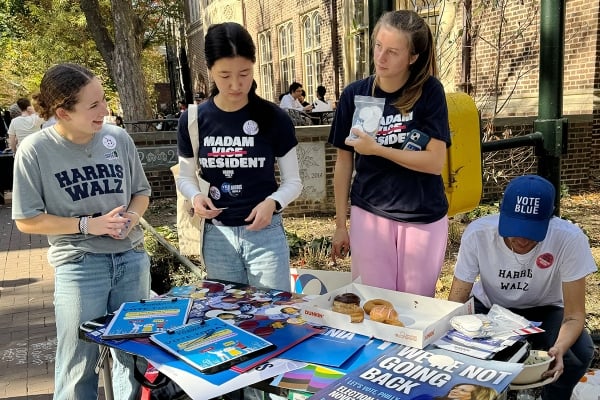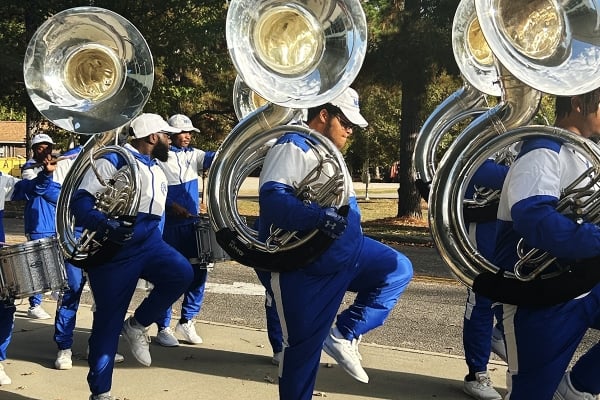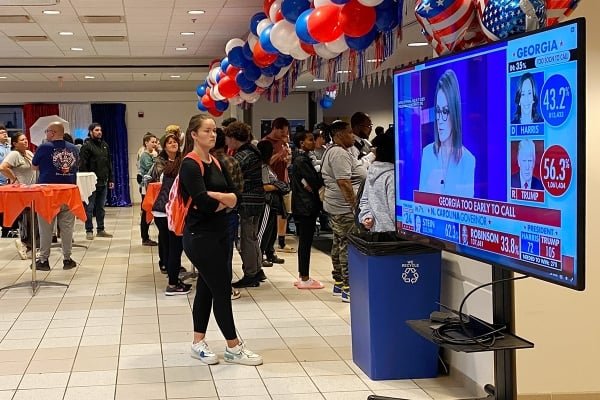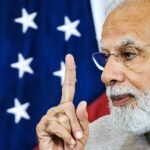Scenes from a long day of waiting and voting on campus
(Updated at 8 a.m., Nov. 6)
President Donald Trump is returning to the White House.
What role college students played in that result is still unclear, but they appeared to turn out in large numbers in key swing states Tuesday.
At the nine campuses in four states and the District of Columbia that Inside Higher Ed visited, students embraced their role in potentially electing the country’s first woman president, though not everyone was sold on Vice President Kamala Harris and others supported former president Donald Trump.
A record 66 percent of college students voted in 2020, and analysts credited them with helping to elect President Biden. Experts predicted their turnout could match or even exceed that number this year. Student in key swing states such as North Carolina and Pennsylvania rose to the challenge, marching to the polls with their peers—and at times a marching band.
Reproductive rights were a key issue for some students we spoke to, particularly young women, while others said they were voting for third-party candidates because of Harris’s stance on the Israel-Hamas war.
Some waited for hours to cast their votes. Eight college campuses in Wisconsin had one- to two-hour lines late in the day, MSNBC reported. Even after polls closed in Nevada, the wait time at a University of Nevada at Reno polling place was three hours. In Boone, N.C., which was ravaged by Hurricane Helene, voters at the Appalachian State University polling place waited as long as four hours to cast their ballots.
In Pennsylvania, students lined up for blocks. Temple University students waiting outside Bright Hope Baptist Church in Philadelphia gratefully accepted offerings of free Doritos and pizza and delighted in a surprise visit by actor Paul Rudd, who handed out water bottles, The Philadelphia Inquirer reported. One woman held up a sign that read, “High fives for first-time voters.” The president of Lehigh University, Joseph Helble, stood in line for four hours to vote in Bethlehem, MSNBC reported.
Where Votes Mattered Most
Drexel University students Maria Fitzpatrick, 20, and Zofia Gomez, 19, didn’t grow up in Pennsylvania, but they registered to vote there, hoping to make a difference in the battleground state with 19 electoral college votes. Both voted for Harris.
“It’s a big deal,” Fitzpatrick said. “Our votes could definitely make an impact.”
Historically, young voters have been criticized for low turnout and engagement, but that’s not what she’s seeing on campus.
“It seems like a lot of students are very into the election,” she added. “I think everyone is really nervous also, very anxious … That’s kind of the feeling I’m getting from everyone I’ve talked to.”
Gomez said she feels like she and her family will personally be affected by the outcome of this election: She’s bisexual, she has a trans sibling and her family is Puerto Rican. (She didn’t appreciate Puerto Rico being dubbed an “island of garbage” by comedian Tony Hinchcliffe at a recent Trump rally.) She’s also a first-generation college student.
“It’s very important that I vote for a president … that cares about middle-class families and not just really rich people,” Gomez said.
University of Pennsylvania political scientist Jeffrey Green, the director of Penn’s Andrea Mitchell Center for the Study of Democracy, said college-age voters could be critical in determining who wins the state.

Sara Weissman/Inside Higher Ed
“My understanding is that if Harris does win, she will win in part … because of the youth vote,” Green said. Harris “has a huge advantage among youth voters. She’s devoted a lot of attention … to reaching youth voters through TikTok and other social media campaigns, and she’s been especially astute in her execution of those campaigns.”
But he noted that young Americans’ voting patterns can be difficult to predict.
“They’re harder to get access to, so their preferences are a little bit harder to determine, but more importantly, whether they’re going to show up or not … is harder to know,” he said. “For both sides, I think it’s a mobilization game.”
He added that while college campuses are disproportionately liberal, there are significant numbers of conservative students at Penn. Whatever happens, he said, it will be crucial that students on opposing sides are able to talk to each other. He said his center prides itself on sponsoring the Penn Political Union, which hosts speakers across the ideological spectrum and student debates.
“Ideally we want to create a space here where people can explore the issues and test out ideas about American politics and global politics,” he said.
Penn student Richard Macedo, 21, grew up in Massachusetts but voted in Pennsylvania, where he believes his vote matters more.
“Many are saying we’ll be the deciding state,” Macedo said. “It at least gives me the impression that what I decide has a bigger impact on what’s actually going to happen.”
He said Trump’s rhetoric about immigrants was the main issue driving his vote for Harris. His family now lives in Brazil but they were undocumented when they lived in the United States; as a citizen, he’s currently applying to sponsor them so they can return.
Temple University student Cullen McCormick, 19, said he felt “very adult” while waiting to cast his ballot, like his political opinions had consequences for the first time. He grew up in a Republican family in Bucks County, among the state’s most divided areas, but said he planned to vote for Harris.
“It’s very liberating to finally be like, OK, I’m going to vote against what my family votes,” he said.
Marissa Smith, a freshman at Temple, lit up as she described what it felt like to vote for the first time, particularly in a state where the margins are so tight. Smith, who’s from Massachusetts, said she’s scared of the “entirety” of Project 2025, a blueprint for a second Trump presidency spearheaded by the conservative Heritage Foundation, and she wants to do what she can to prevent those plans from being enacted.
In Pennsylvania, she feels like “one vote could literally change everything,” she said. “You could be that person who changes who the president would be.”
Women for Reproductive Rights
At the University of Pennsylvania, Tatiana Wilkins and Chinenye Ilodianya, both 18 and first-time voters, said their support for abortion rights drove them to the polls early in the day.
“All the stories I’ve been hearing about women having to travel to different states to get abortions and women dying because they couldn’t travel are really concerning to me,” Ilodianya said.
Wilkins plans to go into medicine and agreed that the issue of reproductive rights was “really, really important” to her, along with gun control.
“I feel like our world has become incredibly dangerous,” she said.
Aliyah Scott, a freshman at the University of North Carolina at Pembroke, was looking for a ride to the polls, where she planned to cast her first presidential vote for Harris because of her views on reproductive rights.
“I’m really here for women’s rights and how women should be able to pick what they want to do with their bodies,” Scott said. “I feel like nobody should be able to tell a woman what she should be able to do with her body.”
Helping Students Get to the Polls
From minivans to parades, student groups and colleges pulled out all the stops to help students get to the polls.
At UNC Pembroke, a white minivan was on hand, ready to transport students to local voting sites. At an information booth, students could find resources to locate their polling place or to relieve stress, including heart-shaped red stress balls that read, “Vote your values.”
Volunteer Galilea Ruiz, 19, a sophomore, voted early but said this election seemed to have “crept up” on many of her fellow students, “so a lot of them do have to vote today.” Motioning to the shuttle, she said, “I’m glad we do have this for at least the students who are local, since this school does have a lot of students who are from the Robeson County area.”
About 45 minutes up Interstate 95, at Fayetteville State University, a historically Black institution where many students have ties to the nearby Fort Liberty Army base, voting awareness efforts went into overdrive Tuesday afternoon. The Marching Bronco Xpress band played its way to the student union, where student leaders and groups kicked off the third and final voter awareness march of this election season.

Marching Bronco Xpress members play during the voting awareness march Tuesday at Fayetteville State University in North Carolina.
Colleen Flaherty/Inside Higher Ed
Fayetteville State is in Cumberland County, where voters went majority Democratic in 2016 and 2020.
Charlece Corbin, a 20-year-old from North Carolina and vice president of the Student Government Association at Fayetteville State, told the crowd, “Voting is not just a civic duty. It is a powerful tool for justice and change. Every election gives us the opportunity to advocate for fairness, quality and progress in our communities. Our vote is our voice, and when we cast our ballots, we are saying that we will not sit idly while decisions are made for us. Instead, you choose to shape the future.”
Third-Party Candidates
Some students expressed dissatisfaction with both major party candidates.
Oliver Sanders, a freshman at Towson University, said he had been planning to cast his first presidential ballot for Harris—until his walk to the polling site on the outskirts of the campus. That’s when he decided to support Claudia De La Cruz, the nominee of the Party for Socialism and Liberation, he told Inside Higher Ed. (De La Cruz is on the ballot in 19 states, though Maryland is not one of them.)
For Sanders, Palestine is the most important issue this year by a long shot, and he said he thought Harris appeared to be courting pro-Israeli Democrats instead of those who support the Palestinian cause.
“I know Claudia isn’t going to win, but I can’t consciously vote for someone who is anti-Palestinian,” he said.
Tim McGowan, a recent Towson alum who was still registered to vote at his campus address, cast a ballot for Robert F. Kennedy Jr.
“I’m hopeful, because I think people are seeing that the options we’re given are not good for the country, and I think more and more people are voting third-party, going independent,” he said. “People are starting to think for themselves.”
Last-Minute Decisions in Arizona
As polls closed on the East Coast, hundreds of students at Arizona State University were still lining up to vote at the Sun Devils Sports Complex in Tempe.
Tem Nu, a first-year biosciences major, was still undecided when he got in the hourlong line around 5 p.m.
“I’m probably going to do some research while I’m in line,” he said. He noted that lowering the cost of college is one of the most important issues for him, though he still had “no clue” which candidate’s policies would better support that.
Both Trump’s and Harris’s campaigns aggressively courted college students this year in Arizona, where President Biden beat Trump by a little more than 10,000 votes in 2020. On Tuesday, supporters of both candidates set up tables opposite the long line of voters, attempting to make one final case for their candidates while they passed out pizza, cookies and water bottles.
Arizona’s ballot includes a host of other statewide offices and ballot measures, including Proposition 139, which would make abortion a constitutional right in the state.
“Vote yes on Prop 139 if you actually care about your bodily autonomy, especially if you’re a woman,” one activist shouted next to the line of voters, directly behind another cluster of activists wielding signs that said “Abortion is NOT healthcare” and “No on Prop 139—Abortion in AZ is already legal up to 15 weeks.”
Reproductive rights were a key reason why Nia Meunier, a freshman accounting major and first-time voter, lined up to cast her ballot on Tuesday evening.
“I think it’s very important to not let the former president [Trump] back in office,” she said. “I like Harris’s policies and what she stands for.”
For Dominic Bader, a first-time voter and finance major at ASU, Trump’s experience in the business world was the deciding factor.
“I don’t know too much about all the other issues,” he said, minutes before he walked into the booth to cast his vote for the former president. “I’d just like to make money.”
Watching and Waiting
At Towson University, students put the “party” in “watch party.” A DJ spun tunes so loud attendees had to raise their voices to talk; few people listened to the early returns on CBS.
They also organized games, including trivia and a spelling bee, to help students engage with the election while leaving stress at the door. (The prizes were nothing to scoff at, either; they included Beats headphones, an iPad and a smart TV.) Students could also head to the dimly lit “relaxation zone” to escape from the numbers rolling in with snacks, tea and guided meditation.
“Elections can be intense, but they’re also incredibly important,” said Jenna Jalloh, director of government affairs for the Student Government Association. “This event gives us a chance to support each other, learn together and celebrate the power of our voices.”
Red, white and blue balloons and streamers festooned the student center at Gallaudet University in Washington, D.C., where students gathered for pizza, ribs and macaroni and cheese ahead of the election watch party.
The party was the culmination of the university’s SignVote program, a nonpartisan voter engagement initiative housed in the Center for Democracy in Deaf America, to invite students and community members to learn more about civic engagement and feel energized about voting in American Sign Language.
Several hundred students attended in person, with another 270 or so joining via Zoom; a live transcript and interpreters also made the event accessible to those who don’t speak American Sign Language. Brendan Stern, executive director of the Center for Democracy in Deaf America, and Deig Ozuna-Clark hosted panel discussions with faculty members and other experts to discuss American politics and polling.
Student Trent Mora said that he hopes the day after the election people are still talking to one another and exchanging ideas. Ella Stromberg, a senior, noted that coping with election results is a hard, stressful process, and it won’t end Wednesday. But at least she hopes to find some sense of stability.
You may be interested

Zach Bryan Releases Surprise New Single ‘This World’s a Giant’
new admin - Nov 07, 2024[ad_1] Amid very public breakup with Brianna Chickenfry, singer plans to release another new song, "Motorbreath," on Friday Just four…

‘Warm and comfortable’ jumper dress is ‘perfect length’
new admin - Nov 07, 2024[ad_1] Jumper dresses are the perfect outfit choice when you want to keep warm while looking stylish over the colder…

“Mornings Memory”: 90-year-old Effie Nielson breaks records in weightlifting
new admin - Nov 07, 2024"Mornings Memory": 90-year-old Effie Nielson breaks records in weightlifting - CBS News Watch CBS News Our "Mornings Memory" takes us…



































